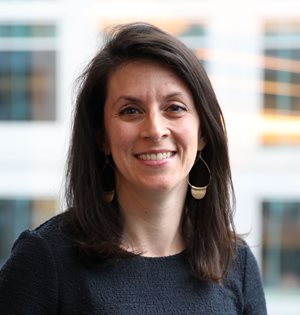Financial readiness for homeownership is a topic that’s always on my mind. So I was happy to join Zillow Group and National League of Cities for a panel last week that addressed that very subject, especially during a time when homeownership feels out of reach for so many people.
 How out of reach? Zillow research shows that when asked what it would take to own a home, more than half of Gen Zers and Millennials believed the answer was a lottery ticket, according to Lauren Lowery, director of Housing and Community Development and our panel’s moderator.
How out of reach? Zillow research shows that when asked what it would take to own a home, more than half of Gen Zers and Millennials believed the answer was a lottery ticket, according to Lauren Lowery, director of Housing and Community Development and our panel’s moderator.
I’m here to tell you that there are other answers – and that homebuyers should stop telling themselves "no" before they get to "yes." Homeownership doesn’t have to be impossible; it doesn’t have to be a lottery ticket.
My fellow panelists and I were able to share information about programs that help would-be homeowners. Karen Rebaza’s Boston Home Center works to help individuals find sustainable, affordable housing in Boston. Kayla Schuchman’s Minnesota Housing does the same in a state where there’s a high rate of homeownership – but a large gap between white homeowners and homeowners of color. And Amy Wipfler of Zillow represented the private market, explaining a Zillow tool that helps users search through the many down payment assistance programs that are out there.
At NeighborWorks America, we and our 247 network organizations have been helping people achieve their dreams of homeownership for 45 years – especially in communities of color and low-income communities. Our network provides financial coaching and housing counseling to strengthen consumers’ financial health, prepare them for homeownership and connect them with down payment assistance, affordable loans and other resources. Counselors are also skilled at layering multiple sources of down payment assistance, which is often how a home that was once out of reach becomes affordable.
In fiscal year 2022, NeighborWorks and our network organizations helped homebuyers access nearly $134 million in down payment assistance, which can be the difference between dreaming of purchasing a home and making that dream a reality.
HUD’s Comprehensive Housing Counseling Grant Program has provided NeighborWorks with funds for our network counseling agencies for over 20 years. As one of HUD’s largest intermediaries of this program, NeighborWorks has supported these agencies and their communities, allowing them to provide counseling services to clients on everything from affordability and property maintenance to scam prevevention and more.
I also want to point out that our focus on financial readiness isn’t just something that happens before a client buys a home; it continues long after the purchase. Financial readiness is how you prepare for maintenance and obstacles. It’s navigating the bumps along the way, helping people meet their needs and maintain their homes – and wealth – for the long term. Our network is there to support homeowners before a purchase, during and after.
I want to share some of my takeaways from our hourlong conversation here; a conversation that I hope will continue:
- Know your community. That’s one area where NeighborWorks network organizations excel. They know their community, the culture, the demographics and the needs in those communities, and they reflect them back in the services they provide. Many of our network organizations present information – and educational tools such as our Realizing the American Dream or Keeping the American Dream publications -- in the native languages of the populations they serve, an essential means of gaining trust and reaching those populations. It’s more than Google Translate. You need a bilingual and bicultural staff, similar to the background of the people you serve. NeighborWorks America’s network created nearly 19,000 new homeowners in fiscal year 2022, 57% people of color. Earlier this year, NeighborWorks published an outreach guide of successful strategies for connecting with different populations.
- Understand the barriers. You have to understand the barriers for the borrowers you’re trying to serve, too, said Kayla. And make sure you build policies, tools and relationships to address those barriers. "We really target community outreach," she said – whether it’s showing up in the park for a Juneteenth celebration or attending a celebration for Mexican Independence Day.
- Sustainability is crucial. A home is a lifetime investment, Karen said, and sustainability of that purchase is crucial. In Boston – as in other places – high real estate prices can make purchasing a home more of a challenge. It’s important to create more affordable homes – and affordable mortgages. She mentioned the One+ Boston Homebuyer Program, which provides low-interest mortgages to qualified Boston homebuyers. We need more programs where private organizations and municipalities work together, she said.
- Consider the culture. It’s been a banner year of down payment assistance for Minnesota, Kayla shared, with the General Assembly setting aside millions in funding, including for an interest-free mortgage product that instead incorporates fees that are part of owning a home. She explains that this is especially good for populations where paying and receiving interest is counter to their faith, such as the Muslim community. NeighborWorks Home Partners, a NeighborWorks network organization, will help Minnesota Housing distribute these funds.
- Remember the goal. We all agreed that housing is, as Kayla said, a continuum. Homeownership isn’t for everyone and we have to have the tools to help people meet their needs, whatever they may be.
- Three questions. Success looks different for different people. Need a gut check? Amy suggests these three questions: Are you safely and securely housed for the foreseeable future? Does your housing support your lifestyle and personal goals? Are you financially able to afford your housing costs?

